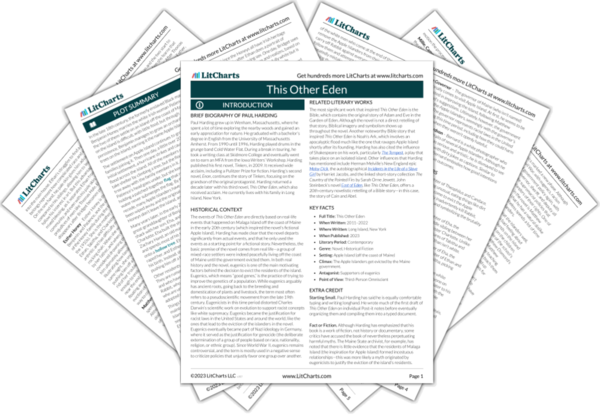Welcome to the LitCharts study guide on Paul Harding's This Other Eden. Created by the original team behind SparkNotes, LitCharts are the world's best literature guides.
This Other Eden: Introduction
This Other Eden: Plot Summary
This Other Eden: Detailed Summary & Analysis
This Other Eden: Themes
This Other Eden: Quotes
This Other Eden: Characters
This Other Eden: Symbols
This Other Eden: Theme Wheel
Brief Biography of Paul Harding

Historical Context of This Other Eden
Other Books Related to This Other Eden
- Full Title: This Other Eden
- When Written: 2011–2022
- Where Written: Long Island, New York
- When Published: 2023
- Literary Period: Contemporary
- Genre: Novel, Historical Fiction
- Setting: Apple Island (off the coast of Maine)
- Climax: The Apple Islanders get evicted by the Maine government.
- Antagonist: Supporters of eugenics
- Point of View: Third-Person Omniscient
Extra Credit for This Other Eden
Starting Small. Paul Harding has said he is equally comfortable typing and writing longhand. He wrote much of the first draft of This Other Eden on individual Post-it notes before eventually organizing them and compiling them into a typed document.
Fact or Fiction. Although Harding has emphasized that his book is a work of fiction, not history or documentary, some critics have accused the book of nevertheless perpetuating harmful myths. The Maine State archivist, for example, has noted that there is little evidence that the residents of Malaga Island (the inspiration for Apple Island) formed incestuous relationships—this was more likely a myth originated by eugenicists to justify the eviction of the island’s residents.







